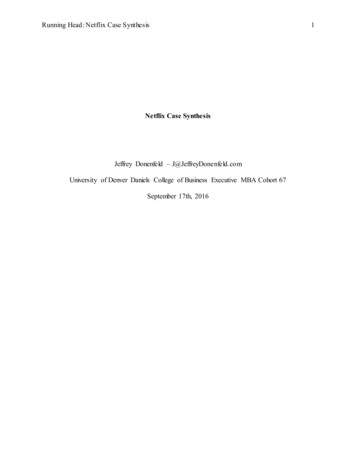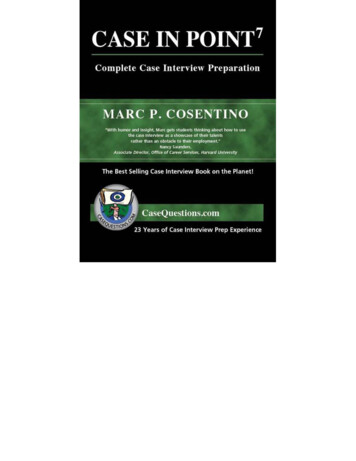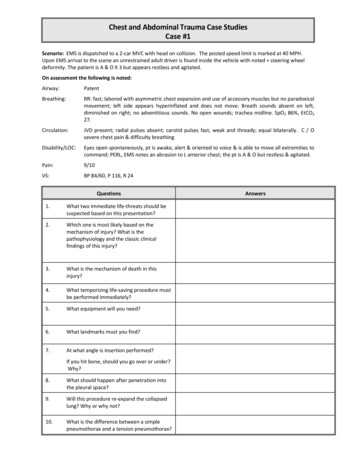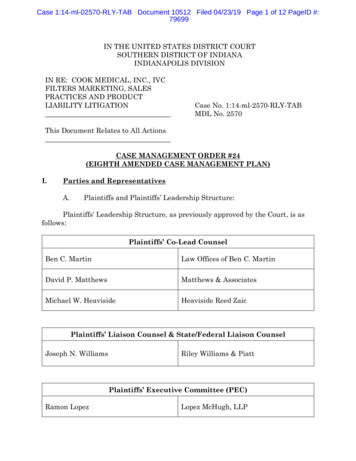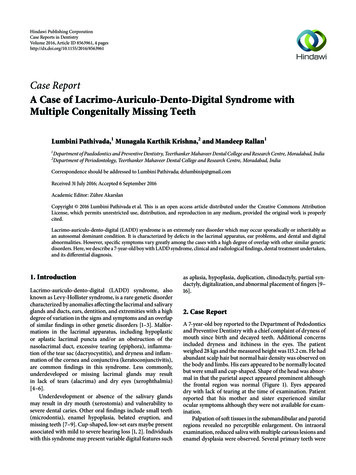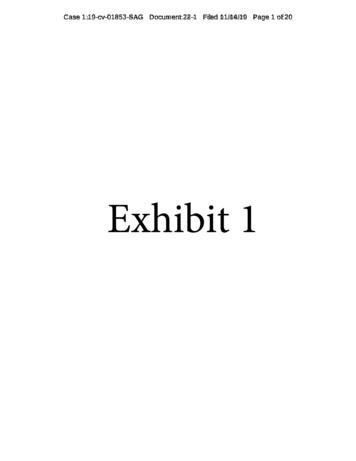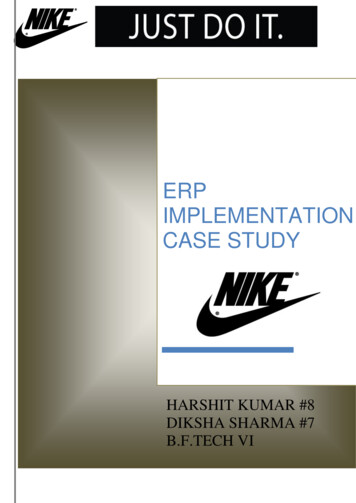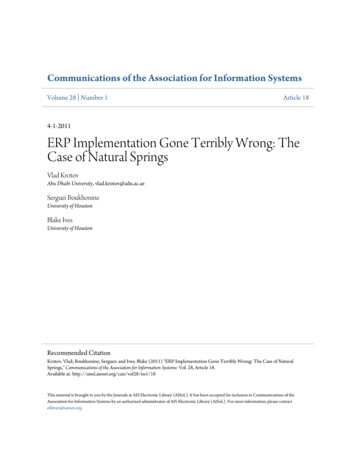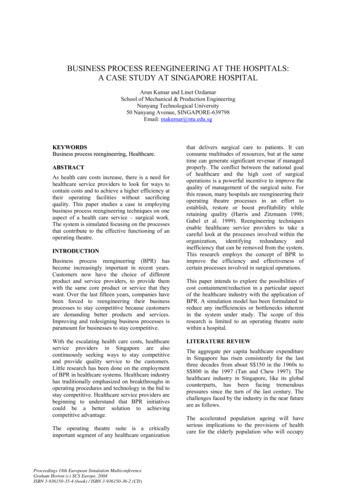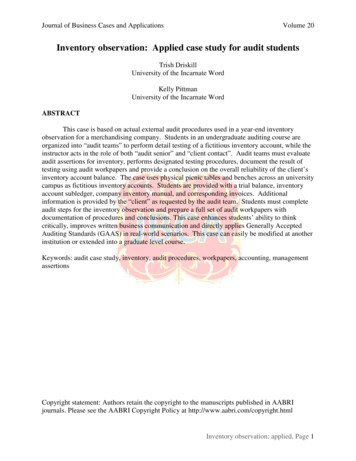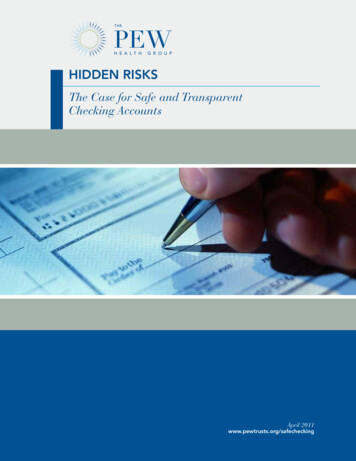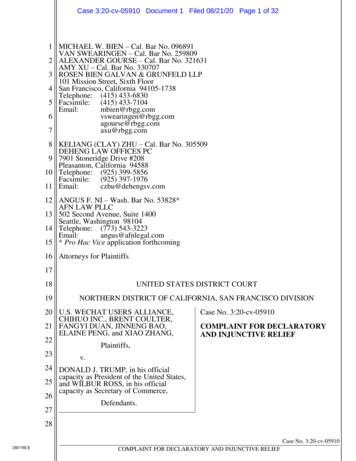
Transcription
Case 3:20-cv-05910 Document 1 Filed 08/21/20 Page 1 of 321 MICHAEL W. BIEN – Cal. Bar No. 096891VAN SWEARINGEN – Cal. Bar No. 2598092 ALEXANDER GOURSE – Cal. Bar No. 321631AMY XU – Cal. Bar No. 3307073 ROSEN BIEN GALVAN & GRUNFELD LLP101 Mission Street, Sixth Floor4 San Francisco, California 94105-1738Telephone: (415) 433-68305 Facsimile: (415) gourse@rbgg.com7axu@rbgg.com8 KELIANG (CLAY) ZHU – Cal. Bar No. 305509DEHENG LAW OFFICES PC9 7901 Stoneridge Drive #208Pleasanton, California 9458810 Telephone: (925) 399-5856Facsimile: (925) 397-197611 Email:czhu@dehengsv.com12 ANGUS F. NI – Wash. Bar No. 53828*AFN LAW PLLC13 502 Second Avenue, Suite 1400Seattle, Washington 9810414 Telephone: (773) 543-3223Email:angus@afnlegal.com15 * Pro Hac Vice application forthcoming16 Attorneys for Plaintiffs1718UNITED STATES DISTRICT COURT19NORTHERN DISTRICT OF CALIFORNIA, SAN FRANCISCO DIVISION20 U.S. WECHAT USERS ALLIANCE,CHIHUO INC., BRENT COULTER,21 FANGYI DUAN, JINNENG BAO,ELAINE PENG, and XIAO ZHANG,22Plaintiffs,23v.Case No. 3:20-cv-05910COMPLAINT FOR DECLARATORYAND INJUNCTIVE RELIEF24 DONALD J. TRUMP, in his officialcapacity as President of the United States,25 and WILBUR ROSS, in his officialcapacity as Secretary of Commerce,26Defendants.2728Case No. 3:20-cv-05910[3601169.5]COMPLAINT FOR DECLARATORY AND INJUNCTIVE RELIEF
Case 3:20-cv-05910 Document 1 Filed 08/21/20 Page 2 of 3212INTRODUCTION1.Public space in the digital age is defined by platforms and users rather than3 physical places with geographic boundaries. Cyberspace, particularly social media, is one4 of “the most important places” to exchange views. Packingham v. North Carolina, 5825 U.S. —, 137 S. Ct. 1730, 1735 (2017). Few digital public squares are as large as that6 found on WeChat. Released in 2011, WeChat is now one of the world’s most popular7 mobile telephone applications (“app”), with over 1 billion monthly active users.182.Approximately 19 million users rely on the app in the United States, and it is9 the primary app Chinese-speakers in the U.S. use to participate in social life by connecting10 with loved ones, sharing special moments, arguing ideas, receiving up-to-the minute news,11 and participating in political discussions and advocacy. 2 As a “super-app,” WeChat users12 also rely on the app to make telephone calls, hold video conferences, upload documents,13 share photos, and make payments. 3 It has become essential to the conduct of daily life for14 its users, many of whom regularly spend hours each day on the app.153.WeChat is also used for numerous societally important purposes, including16 by public institutions. For example, as the coronavirus pandemic continues to separate17 people physically, WeChat has been used in the United States by police departments to18 inform the public about testing center locations, by volunteers to organize the delivery of19 medical supplies, and by families to stay in touch with isolated elderly relatives in nursing201Rayna Hollander, WeChat has hit 1 billion monthly active users, BUSINESS INSIDER21 (Mar. 6, 2018, 11:59 a.m.), illionmonthly-active-users-2018-3; Iris Deng and Celia Chen, How WeChat became China’s22 everyday mobile app, SOUTH CHINA MORNING POST (Aug. 16, w-wechat-became-chinas-everyday23 mobile-app.24 2 Rick Smith, Crackdown on WeChat could hinder millions of US users who rely on socialmedia tool, WRAL TECHWIRE (Aug. 19, 2020),25 y-on-social-media-tool/.26 3 Bani Sapra, This Chinese super-app is Apple’s biggest threat in China and could be ablueprint for Facebook’s future. Here’s what it’s like to use WeChat, which helps a billion27 users order food and hail rides, BUSINESS INSIDER (Dec. 21, rapp-wechat-best-feature-walkthrough28 2019-12.[3601169.5]1COMPLAINT FOR DECLARATORY AND INJUNCTIVE RELIEFCase No. 3:20-cv-05910
Case 3:20-cv-05910 Document 1 Filed 08/21/20 Page 3 of 321 homes. WeChat is also used by individuals and groups—including churches—for2 religious and cultural purposes: group prayer, organizing for holidays and events, taking3 care of the poor, sick and infirm, and education.44.In the United States and across the world, national governments engage in5 dragnet surveillance of digital communications of ordinary people. Because governmental6 surveillance is all-pervasive and occurs at the network level, communications over7 WeChat, like communications on all other apps that run on our systematically surveilled8 internet infrastructure, are captured by this dragnet.95.Despite widespread knowledge of these practices, hundreds of millions of10 people in this country voluntarily use surveilled devices and apps to participate in all facets11 of social and economic life every day. This is the case for WeChat users in the United12 States, where it is widespread knowledge amongst users that both the United States and13 Chinese governments monitor WeChat communications.4 WeChat users in the United14 States continue to use and rely on the app, knowing that Big Brother is watching.156.On August 6, 2020, the President issued Executive Order 13943 entitled16 “Addressing the Threat Posed by WeChat, and Taking Additional Steps To Address the17 National Emergency With Respect to the Information and Communications Technology18 and Services Supply Chain,” 85 FR 48641 (“the Executive Order”). Citing national19 security concerns, the Executive Order bans what appears to be all uses of WeChat by20 anyone within the United States as well as “U.S. persons” outside the United States.21 Section 1(a) of the Executive Order prohibits people and property subject to U.S.22 jurisdiction from carrying out “transactions” with WeChat after 45 days of the Executive23 Order’s issuance. Section 2(a) prohibits any transaction “by a United States person or24254See Arjun Kharpal, Chinese tech giant Tencent reportedly surveilled foreign users ofWeChat to help censorship at home, CNBC (May 8, 2020),26 veillance-help-censorship-inchina.html; Tim Lau, The Government Is Expanding Its Social Media Surveillance27 Capabilities, BRENNAN CENTER FOR JUSTICE (May 22, sis-opinion/government-expanding-its28 2COMPLAINT FOR DECLARATORY AND INJUNCTIVE RELIEFCase No. 3:20-cv-05910
Case 3:20-cv-05910 Document 1 Filed 08/21/20 Page 4 of 321 within the United States” that evades, avoids, or violates the uncertain prohibition in2 Section 1(a). Maddeningly, the Executive Order does not define what those transactions3 include, leaving individuals and companies at a loss as to whether they will risk civil4 and/or criminal prosecution and penalties if they do not fundamentally change the way5 they communicate or run their businesses. The vaguely worded Executive Order was6 issued without further explanation or a media briefing, and states that the Secretary of7 Commerce shall identify what transactions are prohibited after 45 days—in effect,8 delaying identification of what transactions are prohibited until after such transactions are9 already prohibited.5107.Neither the Executive Order itself nor the White House provided concrete11 evidence to support the contention that using WeChat in the United States compromises12 national security. Notably, no other nation has implemented a comprehensive WeChat ban13 on the basis of any like-finding that WeChat is a threat to national security.6 The14 Executive Order was, however, issued in the midst of the 2020 election cycle, during a15 time when President Trump has made numerous anti-Chinese statements that have16 contributed to and incited racial animus against persons of Chinese descent7—all outside17 of the national security context.188.In a stark violation of the First Amendment, the Executive Order targets and195Ana Swanson, Trump’s Orders on WeChat and TikTok Are Uncertain. That May Be the20 Point., N.Y. TIMES (Aug. 7, economy/trump-executive-order-tiktok21 wechat.html.22232425262728[3601169.5]6See Maria Abi-Habib, India Bans Nearly 60 Chinese Apps, Including TikTok andWeChat, N.Y. TIMES (June 29, 2020, updated on June 30, a/tik-tok-banned-india-china.html (statingthat India’s ban is “part of the tit-for-tat retaliation after the Indian and Chinese militariesclashed earlier this month.”).7See, e.g., Nadia Kim, Asian Americans Suffer From Trump’s Racist Attacks Too, PUBLICSEMINAR (July 23, 2020), uffer-fromtrumps-racist-attacks-too/; Li Zhou, Trump’s racist references to the coronavirus are hislatest effort to stoke xenophobia, VOX (June 23, -coronavirus-racism-asian-americans;Matt Stevens, How Asian-American Leaders Are Grappling With Xenophobia AmidCoronavirus, N.Y. TIMES (Mar. 29, 2020, updated on April 10, cs/coronavirus-asian-americans.html.3COMPLAINT FOR DECLARATORY AND INJUNCTIVE RELIEFCase No. 3:20-cv-05910
Case 3:20-cv-05910 Document 1 Filed 08/21/20 Page 5 of 321 silences WeChat users, the overwhelming majority of whom are members of the Chinese2 and Chinese-speaking communities. It regulates constitutionally protected speech,3 expression, and association and is not narrowly tailored to restrict only that speech which4 presents national security risks to the United States. Accordingly, it is unconstitutionally5 overbroad. Indeed, banning the use of WeChat in the United States has the effect of6 foreclosing all meaningful access to social media for members of the Chinese-speaking7 community, such as Plaintiffs, who rely on it to communicate and interact with others like8 themselves. The ban on WeChat, because it substantially burdens the free exercise of9 religion, also violates the Religious Freedom Restoration Act.109.The Executive Order runs afoul of the Fifth Amendment’s Due Process11 Clause by failing to provide notice of the specific conduct that is prohibited; because of12 this uncertainty, WeChat users in the United States are justifiably fearful of using WeChat13 in any way and for any purpose—and also of losing access to WeChat. Since the14 Executive Order, numerous users, including Plaintiffs, have scrambled to seek alternatives15 without success. They are now afraid that by merely communicating with their families,16 they may violate the law and face sanctions.1710.WeChat is the only “super-app” with a natively Chinese interface designed18 for Chinese speakers. That is why it is the dominant social media and e-commerce19 application amongst the global Chinese diaspora, which include Chinese communities in20 the United States. 8 These individuals, particularly those who do not speak English, are21 completely reliant on WeChat to communicate, socialize, and express themselves. As22 such, by prohibiting the use of only WeChat but not any similar applications (ones not23 made in China and without Chinese interfaces), the Executive Order singles out people of24 Chinese and Chinese-American ancestry and subjects them to disparate treatment on the25 basis of race, ethnicity, nationality, national origin, and alienage. In doing so, the26278Thuy Ong, Chinese social media platform WeChat reaches 1 billion accounts worldwide,THE VERGE (Mar. 5, 2018), 8 5]4COMPLAINT FOR DECLARATORY AND INJUNCTIVE RELIEFCase No. 3:20-cv-05910
Case 3:20-cv-05910 Document 1 Filed 08/21/20 Page 6 of 321 Executive Order violates the Equal Protection Clause.211.Finally, in issuing the Executive Order, the president acted beyond his3 authority provided by the International Emergency Economic Powers Act, which precludes4 the President from “directly or indirectly” regulating personal communications and the5 international exchange of information.612.The U.S. WeChat Users Alliance (“USWUA”), Chihuo, Inc., Brent Coulter,7 Fangyi Duan, Jinneng Bao, Elaine Peng, and Xiao Zhang (collectively, “Plaintiffs”), bring8 this suit to challenge the Executive Order, which eviscerates an irreplaceable cultural9 bridge that connects Plaintiffs to family members, friends, business partners, customers,10 religious community members, and other individuals with common interests within the11 Chinese diaspora, located both in and outside of the United States. The Executive Order12 has already harmed Plaintiffs, who are plagued with fear for the loss of their beloved13 connections, whether it be with friends, family, community, customers, aid recipients of14 the charities they run, or even strangers whose ideas enrich their lives. They have been15 forced to divert time, energy, and money to seek alternative communication platforms,16 download and save irreplaceable digital histories, plan for business closures, find other17 sources of information, and try to obtain alternative contact information for those from18 whom they will soon be separated. Even if they succeed to some extent in their mitigation19 efforts, Plaintiffs will never be able to replace the full spectrum of the social interactivity20 that WeChat offers, nor will they be able to find any social networking platform with21 anything close to the same level of participation by the global Chinese diaspora—this is22 because WeChat’s network effects, generated by its 1 billion-plus daily users, is23 irreplaceable.2413.In short, the threatened displacement of these WeChat users from their public25 space is an irreparable harm that requires judicial intervention.2614.For these reasons, and those discussed below, the Court should (1) declare27 that the Executive Order is unlawful and unconstitutional, (2) enjoin Defendants from28 enforcing the Executive Order to prohibit the use of WeChat in the United States by[3601169.5]5COMPLAINT FOR DECLARATORY AND INJUNCTIVE RELIEFCase No. 3:20-cv-05910
Case 3:20-cv-05910 Document 1 Filed 08/21/20 Page 7 of 321 individual users, businesses and groups, and (3) stay the implementation date of any of the2 penalty provisions of Executive Order until a reasonable time after the Secretary of3 Commerce promulgates definitions of “transactions” under the Executive Order.45JURISDICTION AND VENUE15.The claims asserted herein arise under and pursuant to the Constitution and6 laws of the United States. This Court has jurisdiction over the subject matter of this action7 pursuant to 28 U.S.C. § 1331.816.An actual, present, and justiciable controversy exists between the parties9 within the meaning of 28 U.S.C. § 2201(a).1017.Plaintiffs’ claims for declaratory and injunctive relief are authorized by 2811 U.S.C. §§ 2201 and 2202, by Rules 57 and 65 of the Federal Rules of Civil Procedure, and12 by the general legal and equitable powers of this Court.1318.Venue is proper in this District pursuant to 28 U.S.C. §§ 2201 and 139114 (e)(1) because Defendant are officers of the United States acting in their official capacities15 and (1) at least one plaintiff resides in this district; and (2) a substantial part of the events16 or omissions giving rise to the claim occurred in this district. For the same reason,17 intradistrict assignment is proper in the San Francisco Division. See N.D. Cal. L.R. 3-2.1819PARTIES19.Plaintiff U.S. WeChat Users Alliance (“USWUA”) is a New Jersey nonprofit20 organization that is in the process of being registered under Internal Revenue Code section21 501(c)(3), established by individuals in the United States for the purpose of opposing the22 Executive Order. Plaintiff USWUA is made up of WeChat users located throughout the23 United States who are not affiliated with WeChat, its parent company Tencent Holdings24 Ltd. (“Tencent”), nor any political party or foreign government. Plaintiff USWUA runs on25 public donations from WeChat users and organizes its efforts on WeChat. Plaintiff26 USWUA is made up of individuals who want to continue using WeChat within the United27 States and are currently suffering and will continue to suffer an injury based on the28 Defendants’ actions.[3601169.5]6COMPLAINT FOR DECLARATORY AND INJUNCTIVE RELIEFCase No. 3:20-cv-05910
Case 3:20-cv-05910 Document 1 Filed 08/21/20 Page 8 of 32120.Plaintiff Elaine Peng is a United States citizen residing in Castro Valley,2 California. Plaintiff Peng founded the Mental Health Association for Chinese3 Communities (“MHACC”) in 2013 to provide mental health education, suicide prevention,4 assistance, and other resources to her local Chinese community that is underserved by the5 mental health profession due to language and cultural barriers. As president of MHACC,6 Plaintiff Peng strives to make mental health programs available to those in need and has7 received multiple awards for her work. Like much of the Chinese population in the United8 States, Plaintiff Peng uses WeChat as her exclusive means to connect with her Chinese9 families and friends, domestic or abroad. As most of the population MHACC serves relies10 on WeChat to communicate, use of WeChat is also integral to MHACC’s mission to11 provide mental health services and support to its members.1221.Plaintiff Brent Coulter is a United States citizen and WeChat user. Plaintiff13 Coulter holds a Juris Doctor from the University of California, Hastings College of the14 Law (“Hastings”), and lives in San Francisco, California. Plaintiff Coulter previously15 lived in China for approximately five years, where he studied at Sichuan University and16 worked in marketing. While in China, Plaintiff Coulter used WeChat as his main method17 of communication to connect with friends and professional contacts. Now in the U.S., one18 of Plaintiff Coulter’s professional goals is to bridge the gap between China and the U.S.19 with regard to law and business. At Hastings, Plaintiff Coulter founded the Asian Law and20 Business Association, through which he formed a partnership with the American Chamber21 of Commerce (“AmCham”) in Southwest China. Each year, Plaintiff Coulter drafts two22 chapters of AmCham’s annual white paper on U.S. business in China with his colleagues23 in both countries. WeChat is central to Plaintiff Coulter’s annual collaboration and24 remains the only way for him to connect with many of his professional contacts and25 friends in China. Plaintiff Coulter relies on WeChat to build upon his professional career26 which straddles law and business in the U.S. and China. Without WeChat, Plaintiff27 Coulter would lose access to many of the relationships that he has built throughout his28 studies and career.[3601169.5]7COMPLAINT FOR DECLARATORY AND INJUNCTIVE RELIEFCase No. 3:20-cv-05910
Case 3:20-cv-05910 Document 1 Filed 08/21/20 Page 9 of 32122.Plaintiff Xiao Zhang is a Chinese citizen with a valid visa residing in2 Houston, Texas. She is employed as an engineer and founded a nonprofit organization3 known as Hita Education Foundation that supports underserved students at the high school4 in her hometown in China. Plaintiff Zhang uses WeChat to speak with administrators,5 teachers, parents of school children, and to help identify underserved Chinese students who6 would benefit from the program. Plaintiff Zhang’s nonprofit organization currently sends7 donations of 300 yuan (approximately 43 dollars) to seven students per month to pay for8 meals and school supplies. Plaintiff Zhang also uses WeChat to transfer the funds to each9 individual student, and WeChat is her exclusive means to connect with her Chinese10 speaking family members and friends, domestic or abroad.1123.Plaintiff Fangyi “Amy” Duan is a Chines
Chinese governments monitor WeChat communications.4 WeChat users in the United States continue to use and rely on the app, knowing that Big Brother is watching. 6. On August 6, 2020, the President issued Executive Order 13943 entitled “Addressing the Threat Po
